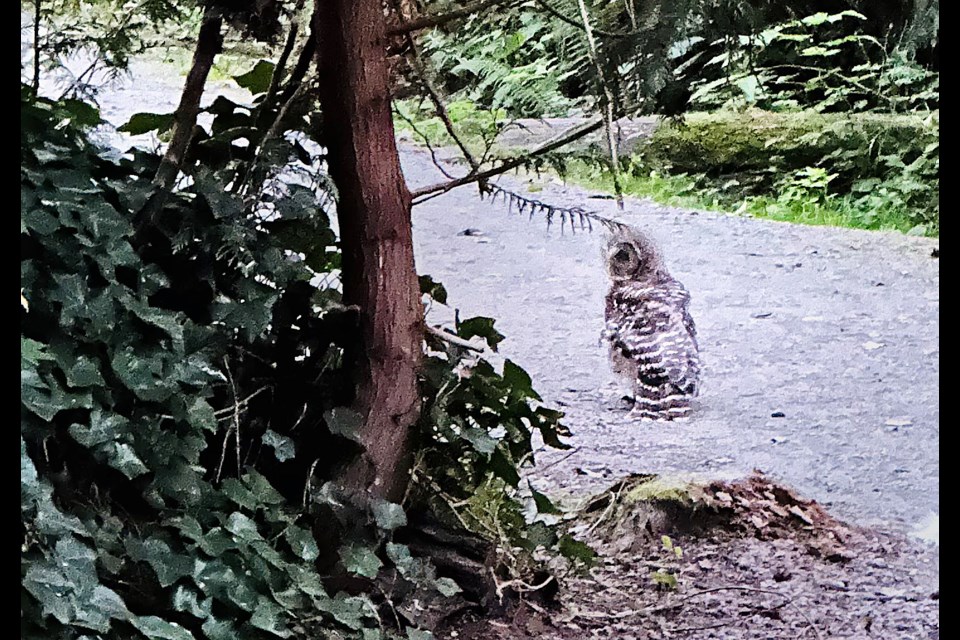Burnaby residents are arming themselves with helmets and umbrellas against a silent menace terrorizing a Burnaby park.
A growing number of runners and walkers at Squint Lake Park at the foot of Burnaby Mountain have been startled by the airborne attacker’s assaults – usually from behind, sometimes drawing blood.
“It’s just a matter of time before she attacks someone again,” area resident Natalia Samartseva said.
The culprit is an owl that has claimed a corner of the park as her or his own and periodically attacks people who venture into it.
Samartseva said she personally knows four people from the neighbourhood who’ve been attacked, two of whom were knocked to the ground.
“Some people have installed a sign there, saying people should be aware; she attacks from behind and people should wear protection, like helmets,” Samartseva said.
She reached out to the B.C. Conservation Officer Service to see if the aggressive bird could be removed and relocated, but she hasn’t heard back.
The service told the NOW there had been no complaints about the bird and, anyway, the province’s conservation officers focus on animals that are deadly to humans, such as cougars and bears.
“They do not attend owl interactions,” stated an email from the Environment Ministry.
The City of Burnaby is aware of the Squint Lake Park owl, according to public affairs manager Chris Bryan.
He said the parks department put up temporary warning signs about two weeks ago and permanent signage is on the way.
“Forests are the owl’s natural habitat – so our main response to these issues when they pop up is to educate and provide warning signs to give people a heads up,” Bryan said in an email. “The city does not capture and kill owls, but we may consider temporarily closing a trail if the owl issue persists in a given area.”
Sofi Hindmarch, an owl expert with the Fraser Valley Conservancy, suspects the bird is a barred owl and says its aggressive behaviour should taper off over the next few weeks.
“They have young right now; they have the owlets, so they’re being defensive,” Hindmarch told the NOW.
The owlets are likely out of the nest by now and are learning to fly nearby, she said.
“They’re just in that stage of becoming independent,” she said.
And the folks at Squint Lake Park might actually be spotting two different owls, according to Hindmarch, since male and female owls raise their young together.
Attacks by barred owls aren’t as uncommon as attacks by other species because they are less shy of humans, according to Hindmarch.
She said barred owls will nest in areas frequented by humans, so interactions between the two are just more common.
But not all barred owls are the same either.
“It really comes down to the individual,” Hindmarch said. “It’s kind of like parents. Some are more helicopter than others, I guess. This one seems to be very clear that no one’s going close to their babies.”
To keep safe over the next few weeks, Hindmarch recommends park goers steer clear of the area especially at dawn and dusk, when owls are most active.
Moving through the area, people should stay vigilant.
Because owls’ wings make almost no noise and they often attack from behind, most people don’t know what hit them before they see the owl flying away.
“They come in quite forcefully,” Hindmarch said. “They can make some pretty serious puncture wounds on your head. I would be very careful.”
Other ways to keep safe include wearing a hat and tucking in ponytails, since the latter look like squirrel tails to owls, according Hindmarch.
She stopped short of recommending helmets or umbrellas, since helmets could injure the bird and umbrellas might end up shredded.
Moving the birds during the nesting season would require permission from the provincial government, which it would be unlikely to grant at this time, according to Hindmarch.
“It’s a sensitive time,” she said. “I think it’s just something that we’ll have to learn to coexist with.”
Follow Cornelia Naylor on Twitter @CorNaylor
Email [email protected]



